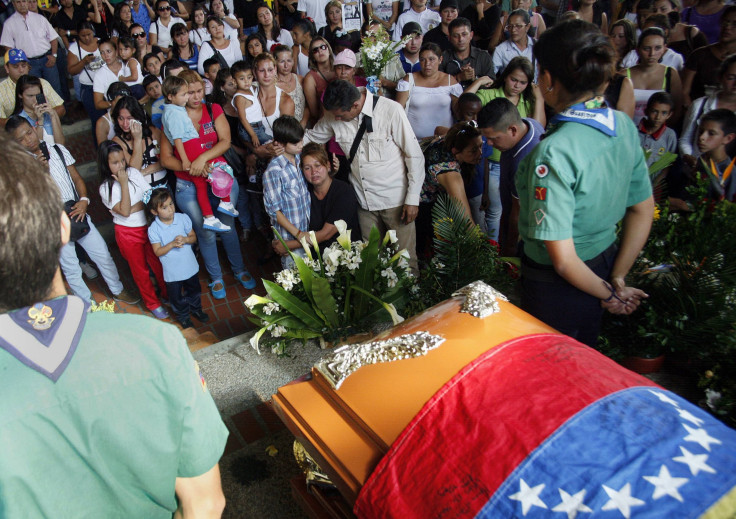Venezuela Shooting Of 14-Year-Old Adds To A String Of Recent Student Deaths

The fatal shooting of a teenage protester this week has unleashed a new wave of anguish in Venezuela. Tensions already had been rapidly escalating in recent weeks over the economy and fears of a political crackdown, but the shooting came on the heels of five other violent student deaths in the country over the past week, setting off a fresh round of student-led protests.
Fourteen-year-old Kluiverth Roa was participating in a protest against the government in the western city of San Cristobal Tuesday, when a police officer fired a rubber bullet, killing him. Photos and video of Roa bleeding on the ground circulated widely throughout the country, sparking a fierce outcry from protesters. Venezuelan government officials denounced the incident and charged the officer involved, Javier Mora Ortiz, with homicide.
The shooting launched a backlash against a law passed by Venezuela’s National Assembly earlier this year allowing security authorities to use lethal force against protesters if they felt they were in a life-threatening situation. Dozens of students marched to the ministry of justice Wednesday to demand a repeal of the law. President Nicolas Maduro condemned the shooting and offered condolences to Roa’s family, but also said protesters had attacked the police beforehand.
Roa’s death marked the first protest-related police shooting since the lethal force law was enacted in late January, but it actually was the latest in a string of recent youth fatalities in Venezuela. Five others were discovered dead from gunshots in three cities in February alone. Yamir Tovar, 22, and Luis Arianyi, 21, were discovered dead in Caracas last week. In Merida, the bodies of Alejandro Garcia, 20, and Jose Frias, 20, were found last week with bullet wounds in their heads. Another student, Jhon Barreto, 21, was found slain in San Cristobal after he had been missing for nearly two weeks.
Four of the students – Tovar, Arianyi, Garcia and Frias – reportedly participated in protests shortly before their deaths, but the circumstances of the incidents are still unclear.
Venezuelan student protesters and members of the political opposition already had demanded investigations of the student deaths before Roa was killed Tuesday. Opposition leaders on Monday requested a meeting with the Organization of American States to discuss Venezuela’s human rights situation in light of the student deaths. But Roa’s killing has heightened international attention and fueled even more outrage among the student community. San Cristobal was the epicenter of mass protests that shook the country for two months last year, and Venezuela's murder rate -- the second-highest in the world -- was a main source of the protesters' anger.
Meanwhile, Cecodap, a Venezuelan nonprofit organization that tracks children’s and adolescents’ rights, released a report Wednesday saying 912 youths were killed in Venezuela in 2014, 126 of whom at the hands of police. The number of police-related deaths of youths surged 55 percent from the year before, the report said. The group called on the defense ministry to revise its lethal force law for police officers: “What happened in San Cristobal with the 14-year-old boy was an abuse of power,” the organization said in a statement, according to Venezuelan newspaper El Universal.
© Copyright IBTimes 2024. All rights reserved.






















